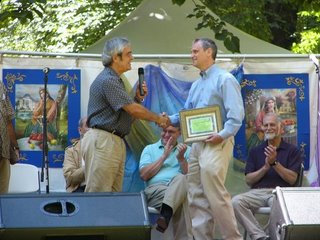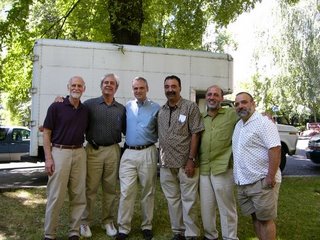US House Resolution 967 Recognizes 100th Anniversary of the Iranian Constitutional Revolution

As it has become an annual tradition, the seventh Portland Iranian Festival took place on the first Saturday of August at the campus of Portland State University in downtown Portland, Oregon. This festival that was first organized seven years ago attracts thousands of Portlanders every year. The time and location of the Festival coincides with Portland Farmers Market and the Annual Bread Festival and brings tens of thousands of people to the PSU campus. This event offers great exposure to tens of NGO's and Iranian organizations and private businesses that participate in the Festival. From the very first year one of the objectives of the organizers was to introduce Iranians as a community proud of its heritage, culture and arts, that serves the host country as best as it possibly can. Business men and women, a wide variety of professions, artists, and politicians have participated in the Festival in the past and this year was no exception. AIFC also had a booth and offered information about its goals and objectives to many who stopped by and showed concerns and supports.
In addition every year an award is presented to an exemplary member of the community who is often time amongst the most outstanding citizens in the community at large. The awardees this year were the Iranian Women Association of Oregon for their tireless efforts in teaching Persian language to the community children.
On August 5th, 2006 which was the hundredth anniversary of the victory of the Iranian Constitutional Revolution, Congressman Earl Blumenauer (OR-3) was the keynote speaker at the Iranian Festival. A week earlier Blumenauer submitted the House Resolution (HR) 967 recognizing and honoring the 100th anniversary of the Iranian Constitutional Revolution. This resolution, after an introductory recitation on the historic course of events that led to the Iranian Constitutional Revolution of 1906,
resolved that:
The House of Representatives-
(1) recognizes and honors the 100th anniversary of the Iranian Constitutional Revolution;
(2) commends the Iranian people for their tradition of constitutional rule and their historical willingness to stand up for freedom and independence;
(3) encourages friendship between the people of the United States and the people of Iran on the basis of shared values; and
(4) recognizes that a strong understanding of Iranian history is critical to the development of constructive policy towards Iran.
Mr. Morteza Anoushiravani, former Portland Water Bureau Director and a long time leader of the community, introduced Congressman Blumenauer. In his remarks the Congressman officially announced his efforts and sponsorship of the resolution HR 967 and passionately spoke of the historic role that Iranians played in the course of the constitutional revolution. Among other items, he noted that Iran has the oldest legislative body in the Middle East that has been in place for more than 100 years. He recalled his first exposure to the history of the world while he was a student of professor Rassekh, an Iranian professor, at Lewis and Clark College some years ago. Congressman Blumenauer outlined the details of the constitutional revolution, praising the democratic ambitions of the Iranian people over the past century. He said “As Howard Baskerville, the American Presbyterian missionary teacher fought along the Iranian freedom fighters during the constitutional revolution, the American people should be with them today in their struggle for democracy”. He then criticized US actions in the 1953 overthrow of Dr. Mossadegh's government and raised the question: “What would be the situation in the Middle East today if that democratically elected government had not been overthrown by the CIA backed coup d'etat?” Congressman then argued that in any solution to problems in the region, Iranian participation is needed and emphasized on portion of the HR 967 that "recognizes that a strong understanding of Iranian history is critical to the development of constructive policy towards Iran."

After the keynote speech, Dr. Goudarz Eghtedari praised Congressman Blumenauer's outreach to the Iranian community and emphasized that congressman has treated his Iranian-American constituency like a true statesman. “Contrary to another resolution introduced by Congressman King, Congressman Blumenauer's resolution not only looks to the history but also to the future and suggests clear solutions for the current struggle” Eghtedari said. Dr. Franz Rad, professor of Civil Engineering at PSU and a member of AIFC presented Congressman Blumenauer with a plaque of appreciation award for outstanding service to the people of Oregon and exemplary recognition of the Iranian-American citizens of the USA. After the ceremony the Congressman met with the leaders of the community and proposed to meet with them on a regular base to coordinate actions of the mutual interest.
109TH CONGRESS
2D SESSION H. RES. 967
Recognizing and honoring the 100th anniversary of the Iranian Constitutional Revolution.
IN THE HOUSE OF REPRESENTATIVES
JULY 28, 2006
Mr. BLUMENAUER submitted the following resolution; which was referred to the Committee on International Relations
RESOLUTION
Recognizing and honoring the 100th anniversary of the Iranian Constitutional Revolution.
Whereas Iran is home to one of the world’s great ancient civilizations;
Whereas, in 1906, Persia had been under the rule of the Qajar Dynasty since 1781;
Whereas the rule of the Qajar Dynasty was corrupt, authoritarian, and weak in the face of competition between the British and Russian Empires for control and influence in Persia;
Whereas, by the turn of the 20th century, the Persian populace sought to counter this corrupt and oppressive authoritarian rule and to secure national sovereignty by codifying a written code of laws;
Whereas by January 1906, diverse sectors of Persian society united to form a protest movement against the foreign manipulation, oppression and corruption that marked the rule of Mozafar al-din Shah;
Whereas, on August 5, 1906 this protest movement forced Mozafar al-Din Shah to issue a decree creating the first representative parliament, the Majlis, in the history of Persia;
Whereas, on December 30, 1906 the parliament ratified and Mozafar al-Din Shah signed Persia’s first Constitution;
Whereas the constitution of 1906 limited the power of the Shah and his ministers, gave administrative autonomy to the provinces, granted limited suffrage to adult men, established the groundwork for a new secular legislature, and guaranteed freedom of the press;
Whereas, following an assassination attempt in February 1908, Mohammed Ali Shah, who succeeded Mozafar al-din Shah, began to purge supporters of the constitution despite his pledge to respect the constitution;
Whereas on June 3, 1908, Mohammed Ali Shah invited leaders of the constitutionalist movement to the Imperial Gardens and imprisoned all but one who managed to escape;
Whereas on June 24, 1908, Mohammed Ali Shah ordered the Persian Cossacks Brigade, led by Russian Colonel Liakhov, to bomb the Majlis and arrest all of its deputies;
Whereas this attack unleashed protests and resistance in support of the Majlis and the constitution across Persia, which evolved into a revolutionary movement;
Whereas the constitutional revolutionaries were joined by Howard Baskerville, a Presbyterian missionary from the United States, who was killed in battle on April 19, 1909, and continues to be revered as a martyr by Iranians to this day;
Whereas on July 17, 1909, Mohammed Ali Shah and a number of his supporters fled Tehran under the protection of Russian soldiers, and the Majlis held an emergency session to reenact the constitution, depose Mohammed Ali Shah, and name his son Ahmad Mirza as his successor;
Whereas, at the conclusion of the Iranian Constitutional Revolution, a democratic movement had replaced an authoritarian government with a constitutional monarchy and established a representative body and the rule of law to check the power of the ruling Shah;
Whereas, since the Constitutional Revolution, Iranian politics has often been marked by struggles against authoritarian rulers and foreign interference, as well as tensions between secular and religious law;
Whereas despite this success, for the next 15 years the Majlis met irregularly due to international circumstances, foreign interference and internal power struggle;
Whereas under government of Mohammed Mossadegh, the Iranian political system became increasingly open and the influence of the Majlis grew until American and British intervention in 1953 reestablished the monarchy, severely undermining Iranian constitutional democracy;
Whereas the Constitutional Revolution demonstrates that democratic self-government is not foreign to Iran;
Whereas the cooperation of Iran is an important factor in the successful resolution of many challenges in the Middle East and Central Asia, including the stabilization of Iraq, progress in Afghanistan, and victory in the war on terror;
Whereas public opinion in the United States respects the people of Iran and their rich culture and history; and
Whereas public opinion in Iran supports better relations with the United States: Now, therefore, be it Resolved, That the House of Representatives—
(1) recognizes and honors the 100th anniversary of the Iranian Constitutional Revolution;
(2) commends the Iranian people for their tradition of constitutional rule and their historical willingness to stand up for freedom and independence;
(3) encourages friendship between the people of the United States and the people of Iran on the basis of shared values; and
(4) recognizes that a strong understanding of Iranian history is critical to the development of constructive policy towards Iran.
 "Of one Essence is the human race,
"Of one Essence is the human race,